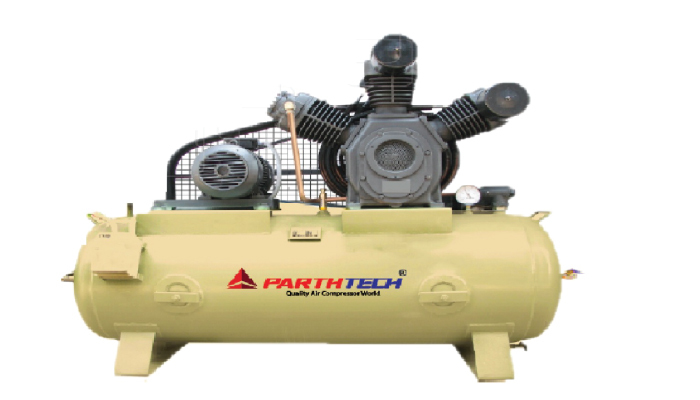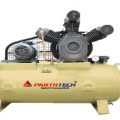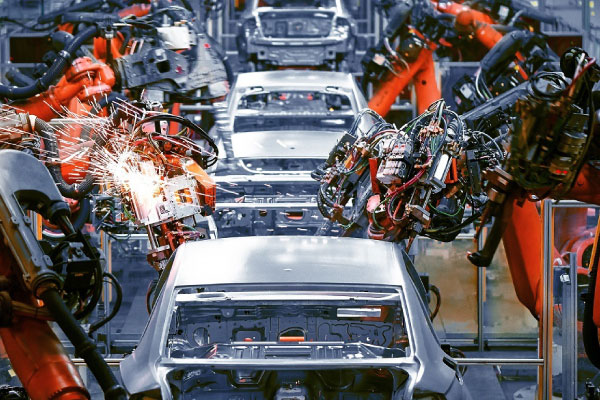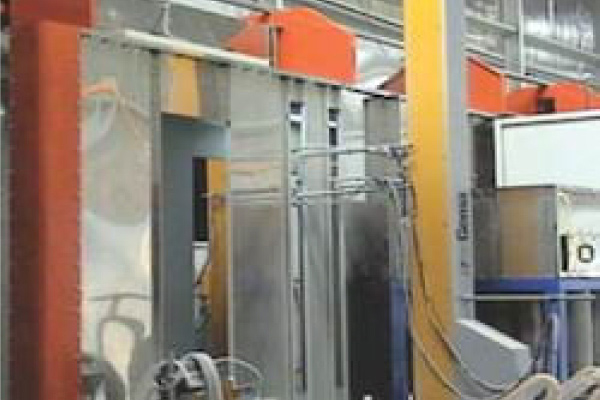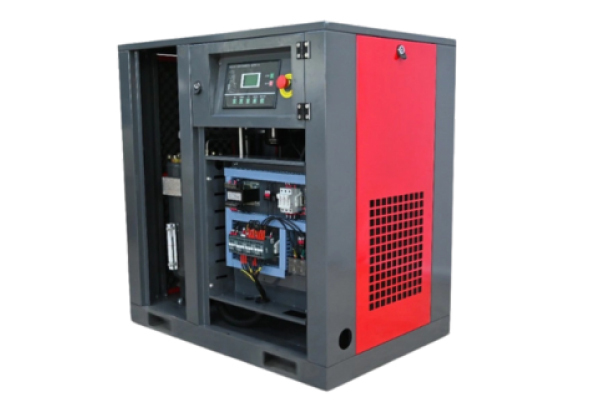-
Call
-
Whatsapp
9825014048
-
Location


Oil Free Air Compressor
Oil Free Air Compressor
Application: Pharmaceutical Industry, Food and Beverage Processing, Medical and Healthcare, Electronics Manufacturing, Dental and Medical Clinics.
Oil-free air compressors have revolutionized industries that demand clean, contaminant-free compressed air. These compressors have found applications in pharmaceuticals, food processing, electronics manufacturing, and more.
In this comprehensive guide, we will delve into the working principles, advantages, maintenance, and key considerations when using oil-free air compressors.
Oil Free Air Compressor
How Does an Oil-Free Air Compressor Work?
To understand the inner workings of oil-free air compressors, it is essential to understand their unique benefits:
Ventilation:
Like all compressors, oil-free components begin with ambient air leaking through the intake filter. This first step keeps the compressed air clean and free of particles.
Compression Settings:
Oil-free compressors use a multistage compression system. Oil-lubricated compressors use oil to lubricate and compress, while these compressors use Teflon-coated compression elements. These compressors offer easy oiling without the need for oil.
Application of Heat:
Forced air produces heat. Oil-free cooling systems are generally included to maintain optimal operating temperatures, including air and water cooling.
Filtration and Separation:
Once compressed, the gas passes through a series of filters. These processes remove any remaining contaminants, leaving the compressed air clean, dry, and oil-free.
Storage:
The purified compressed gas is stored in a receiver and is ready to be used in various applications.
Advantages of Oil-free Air Compressor
- Clean Air: Oil-free compressors are a must for applications where even traces of oil contamination are unacceptable. They provide the purest air, making it ideal for critical applications.
- Reduced Maintenance: Oil-free compressors reduce maintenance and downtime costs by eliminating the need for oil and filter changes, resulting in long-term cost savings.
- Energy Efficiency: Many oil-free compressors incorporate advanced technology to increase energy efficiency, reducing operating costs and environmental impact.
- Environment: Oil-free compressors are environmentally irresponsible, as they eliminate the risk of oil spills or environmental damage. They're also quieter, which contributes to a greener work environment.
- Longevity: Well-maintained oil-free compressors can last longer compared to oil-blended compressors.
Applications of Oil-Free Air Compressors
Oil-free air compressor plays a vital role in many critical applications, e.g.
- Medicine and Health: Power is provided to essential medical equipment such as ventilators, dental chairs and surgical instruments, where proper ventilation is required.
- Food and Beverage: Oil-free compressors ensure the purity of compressed air in food processing, packaging and beverage manufacturing, ensuring product quality and safety.
- Pharmaceuticals: In the pharmaceutical industry, where strict quality standards are applied, oil-free air is needed to homogenize the product.
- Electronics: Preventing contamination during the manufacture of sensitive electrical components in microchips is essential in electronics manufacturing.
- Laboratories: Laboratory tests require clean, oil-free air and sensitive analytical equipment.
- Pressure system: These compressors usually have pressure switches controlling the tank's air pressure. When the pressure reaches a predetermined level, the compressor motor shuts down. As the pressure decreases due to use, the motor turns again to maintain the desired pressure.
- Release of Excess Heat: Heat is generated during the compression process. Some single-stage compressors have cooling wings or other mechanisms to dissipate this heat and prevent overheating.
- Repeat Cycle: The compressor continuously cycles on and off as necessary to maintain the desired air pressure in the tank or to meet the air demand of associated equipment or equipment.
Although oil-free compressors require less maintenance than their oil-blend counterparts, regular maintenance is needed for optimum performance and longevity. Maintenance services include:
- We are maintaining proper operating temperatures.
- Filters and separators should be inspected and cleaned regularly.
- Check the air system for leaks.
- Ensure that unoiled parts are well lubricated.
- I am following the manufacturer's recommended maintenance schedule.
In conclusion, oil-free compressors are the cornerstone of industries that require clean, efficient, and reliable compressors. To utilize their full potential and ensure efficiency and air quality, it is essential to understand their inner workings, benefits, operation and maintenance requirements.
Features of Oil Free Air Compressor
1. Clean Compressed Air:
Oil-free air compressors are designed to provide oil-free air. This makes compressed air suitable for applications where even small amounts of oil can be harmful, such as medicine, food processing and medical equipment
2. Advanced Pressure Technology:
These compressors use state-of-the-art materials and coatings of the compression elements to achieve lubrication and sealing without the need for oil Materials such as Teflon and special polymers facilitate compression while keeping the air clean.
3. Energy Efficiency:
Oil-free air compressors typically incorporate energy-saving features such as variable speed discharge (VSD), and precision control systems. This technology helps improve compressor efficiency and reduce energy consumption, resulting in cost savings.
4. Not Environmentally Friendly:
Oil-free compressors are environmentally friendly because they eliminate the risk of oil spills and environmental damage. They produce less noise pollution, contributing to a greener work environment.
5. Low Maintenance:
Less maintenance required compared to oil-based compressors. No oil changes or filter replacements are required, reducing maintenance costs and reducing downtime.
6. Longevity:
With proper maintenance, oil-free air compressors can outlast their oil-blend counterparts. Their cost-effectiveness and reliability are enhanced by this.
7. Versatility:
The use of oil-free compressors in critical industries, including pharmaceutical, food and beverage, electronics manufacturing, laboratory and healthcare, ensures standardisation of processes and products . . . .
8. Heat Management:
Compressed air generates heat, which can damage compressor parts. In general, oil-free compressors dissipate heat by using air or water cooling systems.
9. Compliance with Quality Standards:
Oil-free air compressors are designed to meet stringent quality and safety standards, making them suitable for use in an air quality monitoring and control environment
10. Customization and Features:
Many compressors can be made oil-free with additional components and accessories, such as air dryers and filtration systems, to meet specific application needs This flexibility ensures compressed air is tailored to the needs of different industries.
| Model | Pistn Displacement | Max. Pressure | Motor H.P. | No of Cyl. | Air Receiver (Ltr) | ||
| CFM | M 3 /H | Kg/CM 2 G | PSIG | ||||
| PT 550 -30L | 2.8 | 4.75 | 8 | 115 | 0.75 | 1 | 25 |
| PT 750-30L | 4.1 | 6.95 | 8 | 115 | 1 | 2 | 40 |
| PT 750-2-50L | 8.4 | 14.24 | 8 | 115 | 2 | 1 | 92/150 |
| PT 30 TNL | 13.6 | 23 | 8 | 115 | 3 | 1 | 150 |
| PT 50 TNL | 15.6 | 26.44 | 10 | 145 | 5 | 2 | 200 |
| PT 75 TNL | 23.8 | 40.33 | 10 | 145 | 7.5 | 3 | 225 |
| PT 100 TNL | 31.5 | 53.39 | 10 | 145 | 10 | 3 | 300 |
| PT 150 TNL | 50 | 84.74 | 10 | 145 | 15 | 3 | 300 |
| PT 200 TNL | 81.8 | 137 | 10 | 145 | 20 | 3 | 500 |
Food and Beverage
In the food and beverage industry, compressed air is used for packaging, conveying, and bottling processes. Two-stage compressors ensure the cleanliness and reliability of the compressed air supply.
Industrial Manufacturing
Two-stage compressors power various manufacturing processes, such as metal fabrication, automotive assembly, and plastic molding. They provide the high-pressure air needed for pneumatic tools, machinery, and automated systems.
Medical Facilities
Some medical equipment and devices, such as dental chairs and surgical tools, require high-pressure compressed air.


FAQs

Frequently Ask Questions
Oil-free air compressors are used in a variety of industries, such as healthcare, pharmaceuticals, food and beverage, electronics manufacturing, laboratories, automotive design and ensure the quality of the air in products a it is essential where oil loading is unacceptable.
Oil-free air conditioning is generally more expensive due to advanced technology and materials. But they offer long-term cost savings through reduced maintenance and energy efficiency.
Yes, oil-free air compressors are suitable for many operating conditions, including high-temperature outdoor environments. Efficient cooling systems are often included to maintain optimal temperatures.
Although oil-free compressors require less maintenance than oil-blended compressors, regular maintenance is necessary. Maintenance tasks include monitoring operating temperatures, inspecting and cleaning exhaust systems, checking air systems for leaks, ensuring non-oil parts are lubricated carefully, following the manufacturer’s recommended maintenance procedure
Yes, parts for oil-free air conditioners are usually available through licensees and manufacturers. Regular maintenance and genuine accessories can help extend the life of a compressor.

